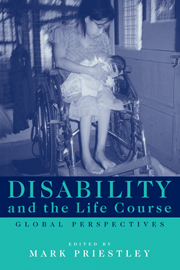Book contents
- Frontmatter
- Contents
- List of figures
- List of tables
- Notes on contributors
- Preface
- Acknowledgements
- A brief note on terminology
- I Concepts
- II Methods and stories
- III The politics of transition
- 13 Disabled children: an emergency submerged
- 14 Failing to make the transition? Theorising the ‘transition to adulthood’ for young disabled people
- 15 Breaking my head in the prime of my life: acquired disability in young adulthood
- 16 Work and adulthood: economic survival in the majority world
- 17 The possibility of choice: women with intellectual disabilities talk about having children
- 18 Ageing with disability in Japan
- 19 Ageing with intellectual disabilities; discovering disability with old age: same or different?
- 20 Epilogue
- Index
16 - Work and adulthood: economic survival in the majority world
Published online by Cambridge University Press: 30 September 2009
- Frontmatter
- Contents
- List of figures
- List of tables
- Notes on contributors
- Preface
- Acknowledgements
- A brief note on terminology
- I Concepts
- II Methods and stories
- III The politics of transition
- 13 Disabled children: an emergency submerged
- 14 Failing to make the transition? Theorising the ‘transition to adulthood’ for young disabled people
- 15 Breaking my head in the prime of my life: acquired disability in young adulthood
- 16 Work and adulthood: economic survival in the majority world
- 17 The possibility of choice: women with intellectual disabilities talk about having children
- 18 Ageing with disability in Japan
- 19 Ageing with intellectual disabilities; discovering disability with old age: same or different?
- 20 Epilogue
- Index
Summary
Economically remunerated employment is a significant marker of adulthood in most societies. Yet many disabled people are denied access to employment and the adult status attached to it. In the majority world, employment is also a matter of economic survival for disabled people and their families. Based on research in Jordan (Turmusani 1999a), this chapter highlights the economic needs and strategies of disabled adults in the majority world from a social model perspective. Here disability is regarded as a social issue rather than an individual one, requiring solutions at the societal level.
In almost all societies, work and the kind of work people do, confers status and personal identity. For example, if someone has work and generates income then they are also more able to support a family. However, many disabled people have been unable to work within disabling environments, although this is generally explained in terms of their perceived functional limitations (Oliver 1990; Barton 1989). This is true both in the West, where the nature of work is fundamental to the way in which status is conferred, and in the majority world, where paid work is fundamental to economic survival. Access to paid work greatly affects disabled people's lives; including their relationships, self-autonomy and participation in society.
Exclusion from work affects the whole of people's lives (Brian and Layzell 1994) and this is central to the exclusion of disabled people in Western society (Stone 1984; Lunt and Thornton 1994).
- Type
- Chapter
- Information
- Disability and the Life CourseGlobal Perspectives, pp. 192 - 205Publisher: Cambridge University PressPrint publication year: 2001
- 5
- Cited by

